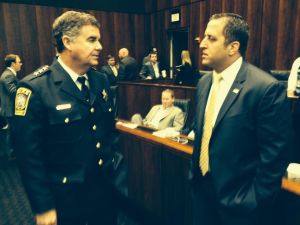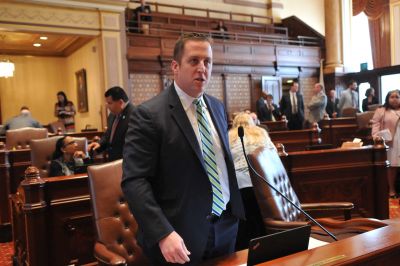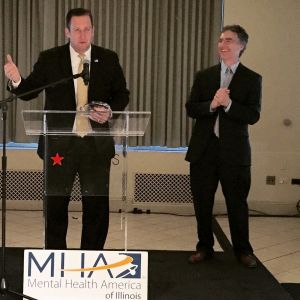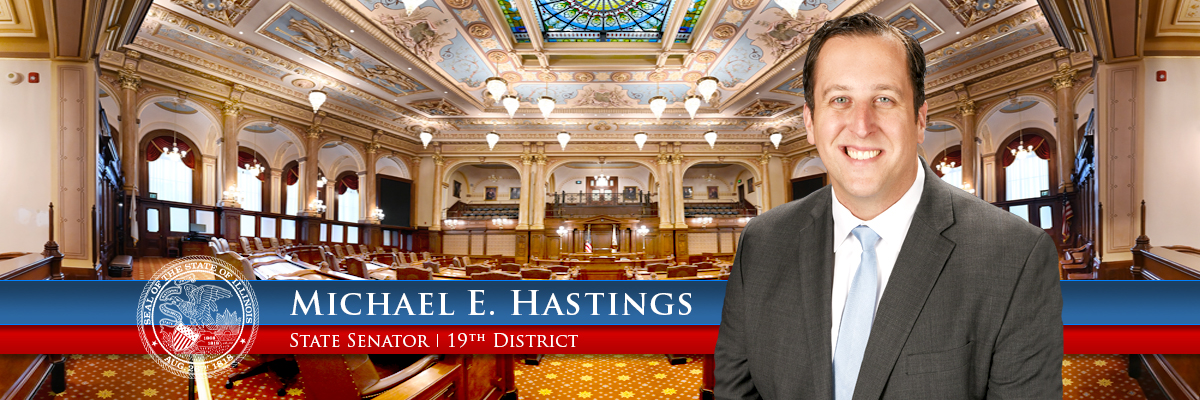- Details
- Category: Press Releases
Dear Friends,
With the unfortunate events brought on by the deaths of Michael Brown in Ferguson, Missouri and Eric Garner in Staten Island, New York, I joined my colleagues in the Illinois House and Senate in supporting a comprehensive law enforcement reform package.
As a part of a comprehensive negotiation process, community groups, law enforcement officials, States’ Attorneys and the Attorney General’s office were all invited and participated in providing a solution.
As a result, Senate Bill 1304 passed both chambers and was signed by the governor today. The legislation provides the following:
• Allows municipalities to equip police officers to wear body cameras to record their interactions over the course of the work day
• Requires all officer involved deaths to be investigated by independent investigators to prevent any improprieties, after which the report must be made public
• Prohibits the use of chokeholds when detaining individual offenders
• Increases the training requirement for all local law enforcement officers, including additional curriculum for basic training, and requirements for continuing in-service training
• Creates a Commission to review current training and certification process for law enforcement officers,
This plan will ensure that our communities will remain safe and allow for police officers to follow safer guidelines for interacting with people. Furthermore, the plan will give the public access to more information surrounding officer-involved deaths to prevent any misinformation caused by the media.
If you have any questions regarding this, please feel free to contact my office at any time.
For Illinois,
Michael E. Hastings
Senator 19th legislative district
- Details
- Category: Press Releases
TINLEY PARK- As the budget negotiations in Springfield continue on, State Senator Michael Hastings (D-Tinley Park) offered the following letter to keep constituents updated:
As a member of the Senate Appropriations Committee, I take our state budget very seriously. The State of Illinois provides essential services to the most vulnerable people in our society. Whether that is senior citizens, mentally and developmentally disabled or foster children, investing in treatments and services to these people provides a far better return on investment versus providing no services at all.
Along with my colleagues in the Illinois Senate and House of Representatives, I presented and supported an investment plan that reduced non-essential state spending and focused on investing in areas of education, social services and paying our debt obligations. Unfortunately, the governor refused to sign that budget due to his extreme agenda which has no direct relationship to the budget.
As a measure to keep our state from shutting down, I supported a temporary one month budget which would allow essential state agencies to remain open and prevent credit agencies from further downgrading our state's credit rating. More importantly, ensuring that the hard working state employees who provide services from issuing drivers licenses to caring for the sick from losing their paychecks.
I have said multiple times that I am committed to passing a budget that funds services for the most vulnerable in our population. I refuse to balance by shutting down cornerstones of our community like Governors State University or not providing services to the mentally and developmentally disabled, which the governor has proposed.
As a member of both the Senate Appropriations Committees, I have been heavily involved with deciding how the state finances should be organized and will continue to fight for a budget solution that makes Illinois fiscally sound and competitive again.
Over the next few weeks, I will be sending out more in-depth information regarding the state budget. If you have any questions please do not hesitate to contact my office at (708) 283-4125 or by email at
For Illinois,
Michael E. Hastings
Senator 19th District
- Details
- Category: Press Releases
 TINLEY PARK- State Senator Michael Hastings (D-Tinley Park) recently co-sponsored House Bill 1 which takes action to combat the proliferation of heroin overdoses that have plagued the South Suburbs.
TINLEY PARK- State Senator Michael Hastings (D-Tinley Park) recently co-sponsored House Bill 1 which takes action to combat the proliferation of heroin overdoses that have plagued the South Suburbs.
"We need to take action collectively to combat this tragic epidemic," Hastings said. "This legislation is one component of the overall solution to stop this problem from spreading further into our communities."
House Bill 1 contains guidelines to be used including:
• Requiring doctors and pharmacies to document when narcotics have been prescribed
• Requiring the State Board of Education to create a heroin and opioid drug prevention program for schools
• Creating a statewide medication take-back program
• Expands pharmacists' ability to dispense lifesaving Narcan to prevent heroin overdoses
• Regulates training for first responders and schools to dispense heroin antidotes
• Requires insurance providers to cover heroin antidotes and addiction treatment services
• Adds Medicaid coverage for alcohol and opioid dependence treatment
The proposal passed with bipartisan support, and now goes to the governor's desk.
- Details
- Category: Press Releases
 TINLEY PARK – Throughout the current session, State Senator Michael Hastings (D-Tinley Park) has fought to keep funding for mental health services intact despite the governor’s frequent budget cuts. Cook County Sheriff Tom Dart and Mental Health America of Illinois recognized Hastings’ efforts and honored him as a local champion of mental health at their 28th annual Gold Bell Gala in Chicago.
TINLEY PARK – Throughout the current session, State Senator Michael Hastings (D-Tinley Park) has fought to keep funding for mental health services intact despite the governor’s frequent budget cuts. Cook County Sheriff Tom Dart and Mental Health America of Illinois recognized Hastings’ efforts and honored him as a local champion of mental health at their 28th annual Gold Bell Gala in Chicago.
“An investment in mental health services will always be a sound investment,” Hastings said. “Facilities and hospitals in my district demonstrate on a daily basis how investments made now can help to avoid more costs down the road and provide for a brighter future for these individuals.”
When mental health programs in his communities were targeted for cuts by the governor, Hastings responded by meeting with executives and recipients from Sertoma Centre and Illinois Mentor to explain his plan to fight the cuts and secure their funding.
Earlier this month, Hastings also voted to close a budget hole that threatened local mental health service providers.
Additionally, he has supported the following pieces of legislation that focus on mental health:
• Senate Bill 1549, which creates an income tax checkoff allowing individuals to make contributions to the Special Olympics in Illinois.
• Senate bill 2129, which provides funding for the home services program administered by the Department of Human Services.
• Senate bill 1249, which requires the governor’s office to identify important mental health services and create a strategy for financing their operations.
More Articles …
Page 74 of 88


